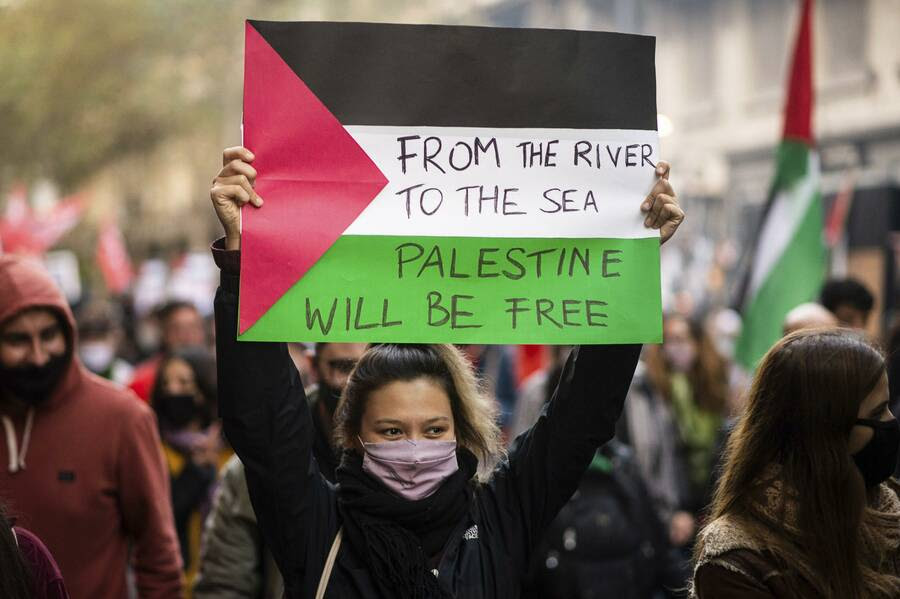Genocide Resumes
TRANSCEND MEMBERS, 11 Dec 2023
Dr. Chandra Muzaffar | JUST - TRANSCEND Media Service
6 Dec 2023 – After an uneasy seven-day truce, Israel and Hamas are now once again locked in a violent combat. Each side has accused the other of violating the truce. What is really important is the consequence of this resumption of conflict.
Thousands more Palestinians in Gaza and the West Bank are going to be killed. According to various sources, within 24 hours of the end of the truce on Friday 1st December, 184 Palestinians were wiped out as a result of Israeli bombardments. This brings the total number of dead Palestinians at the hands of Israeli fire-power since the present phase of fighting broke out on 7th of October 2023 to 15,500. In contrast, 1332 Israelis and others have been killed by Hamas and its allies.
Of the Palestinians killed, it is estimated that over 6,000 are children. That more than a third are children is a matter of great significance especially when we consider the figures for past conflicts between the two sides. During Israel’s Operation Cast Lead for instance from 27th December 2008 to 18th January 2009, children accounted for a quarter of the dead. In another clash between 1st November 2021 and 18th January 2022, 840 Palestinian children died. To this statistic we should add the number of women killed by Israel in the current tussle between the two protagonists. It is estimated that 2700 of them have perished.
The deliberate massacre of children and women is part of a pattern of annihilation closely related to Israel’s overall goal of eliminating Palestinians from their ancestral land. In other words, it is central to ethnic cleansing. In 1948 when Israel was established on Palestinian land, something like 750,000 indigenous Palestinians were expelled or evicted from their homes and villages. This has gone on, at regular intervals, on a smaller scale for the last 75 years. Massacres and military operations against the Palestinians have also been integral to the policy of decimating and destroying Palestinian families and communities. Considered as a whole, the implementation of this policy, buttressed by bellicose pronouncements by Israeli leaders over a long period of time amounts to genocide as understood in international law.
This time, unlike 1948, voices have been raised against the Israeli government’s brutal, barbaric carnage — carnage of largely defenceless, unarmed Palestinians. In villages and cities across the continents, millions of people of all shades and hues are demanding that Israel’s relentless bombardment of Gaza, the most congested place on earth, ends immediately. They want a permanent ceasefire involving all parties in the conflict to be instituted without delay. Citizen groups all over the world should intensify their campaign for a ceasefire mediated and supervised by the United Nations. It is worth noting that Qatar, one of the countries that arranged the earlier truce between Israel and Hamas, is also committed to an immediate ceasefire.
Global citizens demanding a ceasefire should reinforce their call with two other critical concerns. They should request the UN to establish immediately an International Protection Force to ensure the safety of the residents of both Gaza and the West Bank. Such a Protection Force under the auspices of the UN will hopefully deter Israel from its incessant attacks upon civilians in Palestine. It will not only save human beings, especially children, but also offer some protection to hospitals, schools and other public amenities which have all been targeted by the Israeli armed forces.
The other concern relates to water, fuel, food, medicines and the other essentials of life. Since the 7th October Hamas attack on Israeli communities living at the Gaza-Israel border, the Israeli government has imposed even more draconian restrictions upon accessibility to essentials. This has exacerbated the sufferings of the people of Gaza. With the resumption of the genocide, it is feared that many vulnerable groups in Gaza will die from starvation and disease— apart from bombs. The UN through its agencies like WHO and FAO should step in to ensure that there is uninterrupted and adequate flow of essentials to the people. This is an urgent task.
An equally urgent challenge facing the UN is addressing the root causes of the conflict between Israel and Palestine. Unless this is done immediately, the conflict will recur over and over again as it has for so many decades. As many of us have argued for such a long while, the root causes are related to the Israeli occupation of Palestinian land since 1948. The manner in which the UN divided the land —giving the larger portion to the recently domiciled Jewish minority while allowing the indigenous Arab Muslim and Christian majority to remain on the smaller portion — was in itself a supreme act of gross injustice. There was no plebiscite; no attempt to assess sentiments on the ground.
The cruel inhumanity that accompanied the division and the creation of the state of Israel — the expulsions and the massacres — has already been discussed. It is important to emphasise at this point that the Israeli state has perpetuated its power and authority through an apartheid system of governance. In some instances, Israelis and Palestinians have separate laws and separate facilities. There are roads on the West Bank for instance which are prohibited to Palestinians. The water they drink is of inferior quality compared what is available to Israelis.
Apartheid Israel is so comfortably nestled in its privileged dominance that very, very few Israelis are troubled by the discrimination against, and marginalization of, the Palestinians in their midst. There is so little empathy in contemporary Israel for the immense sufferings of the Palestinians. On the contrary, a substantial segment of Israeli society wants its political and military elite to punish Palestinians even more severely for daring to resist Israeli hegemony and aggression.
This is why the pressure upon the Israeli elite and Israeli society to act justly towards the Palestinians will have to come from outside Israeli society. As shown by the mass outpouring of support for the Palestinian cause from all over the world since October 7, pressure will have to come from the people. People’s pressure could be directed towards three targets:
- the Israeli elite;
- the elite in the United States and Britain, Israel’s staunchest supporters in the West; and
- the elite in the Arab countries and the larger Muslim world.
In targeting elites, there is a critical resource the people can harness. This is the Boycott, Divestment and Sanctions (BDS) movement. The movement initiated by Palestinians in July 2005 directed against Israel can play a vital role at this moment. It has already achieved some success. Now is the time to enhance and expand the BDS movement. Citizens all over the world should give a huge push to the movement by persuading more and more institutions, organisations and companies to join the movement so that Israel will really feel the impact of efforts to boycott, divest and sanction her.
Under the BDS rubric, three other measures could be given some consideration:
- A worldwide movement to get those nations that recognize Israel to withdraw their Ambassadors from Israel as a way of isolating the country, diplomatically. This would be a temporary measure aimed at changing Israel’s behaviour vis-à-vis the Palestinians.
- An arms embargo imposed by the UN which prohibits any state or entity from engaging in the arms trade with Israel. The prohibition will also extend to joint ventures in the manufacture of arms and military equipment with Israel or enterprises associated with it. Under this proposal, the US, as a case in point, will have to suspend its military ties with Israel.
- The UN must ensure that no country supplies oil to Israel as long as it pulverizes Gaza and the West Bank. If Arab and Muslim states that exercise considerable influence over the oil market are united in employing oil as a weapon to tame Israel, it is quite conceivable that it will be less contemptuous of the rights of others.
In the ultimate analysis, the question is whether the people have the guts and the gumption to act against an arrogant state that tramples upon the dignity of another with impunity.
_____________________________________________
 Dr. Chandra Muzaffar is a member of the TRANSCEND Network for Peace, Development and Environment, and president of the International Movement for a Just World (JUST). He is the author of the e-book ‘Whither WANA?-Reflections on the Arab Uprisings,’ which is accessible through the JUST website, www.just-international.org.
Dr. Chandra Muzaffar is a member of the TRANSCEND Network for Peace, Development and Environment, and president of the International Movement for a Just World (JUST). He is the author of the e-book ‘Whither WANA?-Reflections on the Arab Uprisings,’ which is accessible through the JUST website, www.just-international.org.
Tags: BDS Boycott Divestment Sanctions, Colonialism, Crimes against Humanity, Cultural violence, Direct violence, Ecocide, Gaza, Genocide, Hamas, Israel, Israeli Apartheid, Israeli Army, Israeli occupation, Jewish Settlers, Massacre, Middle East, Nakba, Netanyahu, Palestine, Sociocide, State Terrorism, Structural violence, USA, United Nations, Violent conflict, War crimes, West Bank, Zionism
This article originally appeared on Transcend Media Service (TMS) on 11 Dec 2023.
Anticopyright: Editorials and articles originated on TMS may be freely reprinted, disseminated, translated and used as background material, provided an acknowledgement and link to the source, TMS: Genocide Resumes, is included. Thank you.
If you enjoyed this article, please donate to TMS to join the growing list of TMS Supporters.

This work is licensed under a CC BY-NC 4.0 License.
